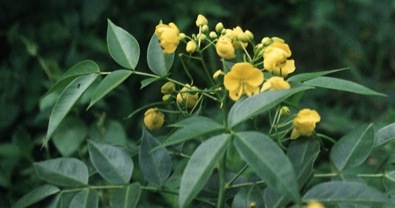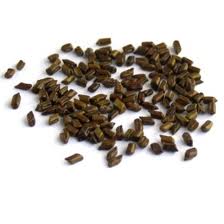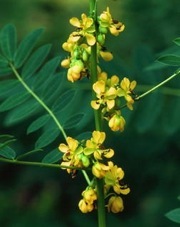Cassia occidentalis: Faux Coffee & Greens
You either cook the Cassia Clan right or they make you sick. Any questions?
Now that I have your attention, they are not as bad as a lot of the toxic plants around, especially if you’re an adult. But, the raw seeds in 2007 did cause the death of three children. On the other side, some Cassias have been used as a coffee substitute and pot herbs since ancient times.
The young shoots, leaves and unripe pods of the Cassia occidentalis, C. marilandica and C. tora, are edible AFTER boiling in a change of water to reduce the strong smell. The torrefied seeds are used as a coffee substitute, though nothing really substitutes for coffee.
That’s all fairly straight-forward until one adds that botanists just can’t leave a genus name be, so the Cassia are also known as Senna marilandia, S.occidentalis, and S. tora.
Cassia (KASS-ee-uh) comes from the Greek word Kassia (ka-SEE-ah.) It was a desert name for some unnamed plant. Marilandica (mary-LAND-ik-uh) means of Maryland, occidentalis (ok-sid-en-tay-liss) of the western world, and tora (TORE-ah) what it means botanically I do not know… Tora is “lion” in Japanese, “now” in Greek. Senna (SEN-uh) is an Arabic name for a thorny bush.
Cassias are found from about west Texas north to Iowa and Florida north to Massachusetts, with California sometimes tossed in.
Green Deane’s “Itemized” Plant Profile
IDENTIFICATION: Cassia occidentalis: Annual plant two to six feet tall, brownish-red young stems, leaves up to eight inches long, compound with eight to twelve ovate to lanceolate somewhat pointed leaves, about one to two inches long. Unpleasant odor when crushed. Flowers yellow, to one inch wide, in clusters, seedpod three to five inches long, to 3/8 inch wide, thin, slightly curved, with thickened edges with about 40 brown, flat seeds one half inch long.
TIME OF YEAR: Summer time
ENVIRONMENT: Rich soils, riverbanks, wastelands, pastures
METHOD OF PREPARATION: Raw seeds purgative, roasted and ground used like coffee, no caffein. Young leaves and pods cooked as greens, very young pods in salads. Cassia are toxic to grazing animals. The plants smell mightily but it dissipated on cooking.






